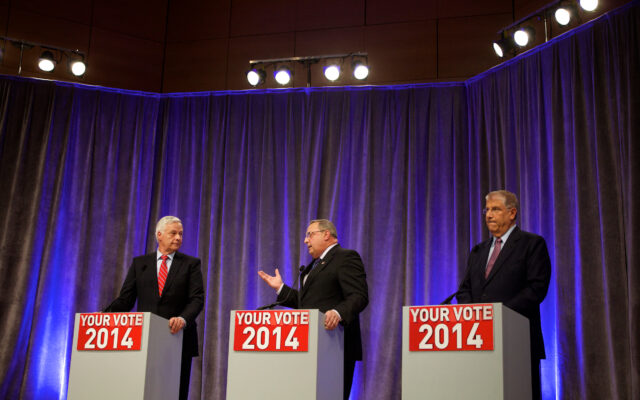
The odds of Maine’s 1st 2-way governor’s race in 40 years just got higher
By Jessica Piper, Bangor Daily News Staff
AUGUSTA – Maine has a shot at seeing a two-way governor’s race for the first time in four decades this year with well-known candidates steering clear of the matchup between Gov. Janet Mills and former Gov. Paul LePage.
Former state lawmaker and anti-Central Maine Power corridor activist Tom Saviello announced Wednesday that he would not be running for governor this year after teasing a possible run last year. Three unenrolled or third-party candidates are still looking to make the ballot.
But it is a different slate compared to previous elections, which featured independents who were either prominent politicians or willing to pour their own money into campaigns. Those potential hopefuls have a lot of work to do to make the ballot. The absence of a high-profile third party candidate would make for a far different election than Maine is used to.
The state has not seen a gubernatorial race with only two candidates since 1982, when incumbent Democratic Gov. Joseph Brennan defeated Republican Charles Cragin. Angus King was elected governor as an independent in 1994 after winning a four-way race including Brennan and Republican Susan Collins. Collins and King are now U.S. senators.
LePage’s two elections were complicated by independent Eliot Cutler, a wealthy lawyer whose late surge over the Democratic nominee in 2010 left him 2 percentage points of being elected governor in 2010. Cutler challenged LePage again in 2014 but won only 8 percent votes.
Independent Alan Caron and Terry Hayes ran alongside Mills and Republican nominee Shawn Moody in 2018, although Caron dropped out and endorsed the Democrat shortly before Election Day. Hayes, then the state treasurer, got just shy of 6 percent of the vote.
An election with no incumbent and large party primaries creates better conditions for independents, said Ted O’Meara, who ran both of Cutler’s gubernatorial campaigns. But that does not describe the circumstances this year.
Mills is the incumbent while LePage has a solid grip on the Republican nomination, as the state party cleared the field for him to run before he announced his candidacy last year. Both have primary challengers now, but there is little reason to think other candidates will gain traction.
“It’s always a more narrow path than for the party candidates, but particularly in a case like this year where you have two really well-known candidates and an incumbent, it makes it very difficult,” O’Meara said.
The gubernatorial race will not use ranked-choice voting. Although Maine voters endorsed the system in a 2016 referendum, the state’s high court found it conflicted with the state constitution and advised against its use in state-level races. It continues to be used in federal elections.
Another court decision could also affect ballot access in the gubernatorial race. A federal judge earlier this year struck down a Maine law that unenrolls voters from a party if its membership is not large enough. The decision, which stemmed from a lawsuit by the Maine Libertarian Party, allows Libertarians to collect signatures from voters outside their party.
Gubernatorial candidates running under a party typically need 2,000 signatures from members of their own party to make the ballot, a challenger for parties with smaller membership. Party candidates must submit signatures to the Maine Secretary of State’s office by March 15, while unenrolled candidates must turn in 4,000 signatures by Jun. 1.
Potential candidates for a third slot on the ballot now include former legislative candidate Michael Barden of Limington and Beals physician Sam Hunkler, who are looking to run as independents, as well as Libertarian Harrison Kemp of Old Town. Neither Kemp nor Hunkler responded to requests for comment on Wednesday.
Barden, who ran for the Legislature as a member of the Green Independent Party, is running for governor as an unenrolled candidate because the Libertarian ruling has not been applied to other small parties in the state. He said he has been called “Eliot Cutler-lite” on the campaign trail as some worry his presence could throw the race away from their preferred candidate.
But Barden rejected that framing, saying the Republican and Democratic parties were “closely aligned.” He noted he opposes the CMP corridor, unlike Mills and LePage.
“I am an actual choice as opposed to, ‘Which side of the aisle do you want exploiting the state?’” he said.
BDN writer Michael Shepherd contributed to this report.